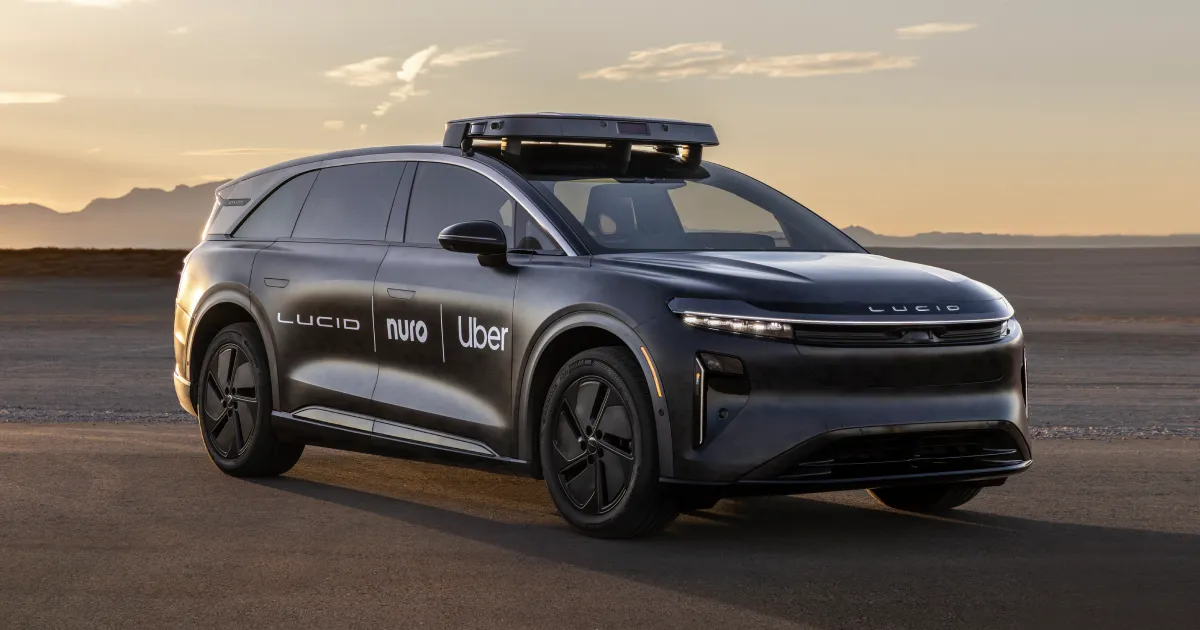Uber invests $300M in Lucid and Nuro to launch premium robotaxi service

In a bold move to establish itself as a dominant player in the autonomous vehicle race, Uber has announced a sweeping investment strategy that includes partnerships with electric vehicle manufacturer Lucid Motors and self-driving technology startup Nuro. The company plans to pour hundreds of millions of dollars into these firms as it lays the groundwork for a premium robotaxi service, aiming for a launch as early as next year.
$300 Million to Lucid, 20,000 EVs to Follow
As part of the deal, Uber will invest $300 million into Lucid Motors and commit to purchasing at least 20,000 of Lucid’s upcoming Gravity SUVs over the next six years. These vehicles will be specially outfitted with autonomous driving systems developed by Nuro, creating a new generation of electric, driverless taxis.
These robotaxis won’t be confined to Uber's own fleet; third-party partners will also operate them. The strategy reflects Uber's increasingly asset-light approach while still making a significant bet on owning or controlling key parts of the ride-hailing ecosystem.
A Bigger Bet on Nuro
While the Lucid investment is sizable, Uber’s financial commitment to Nuro is even more substantial, though the exact figure remains undisclosed. According to a source familiar with the matter, Uber’s investment in Nuro surpasses the $300 million deal with Lucid, signaling a deeper trust in the company’s autonomous vehicle capabilities.
Nuro’s co-founder and president, Dave Ferguson, revealed that the deal has been a year in the making and that Nuro was chosen after Uber evaluated nearly every major player in the self-driving space. “Uber was looking to make a very large commitment to a robotaxi program,” Ferguson noted. “We were thrilled that, at the end of all that, we were the partner that was chosen.”
Testing Underway
The collaboration has already moved beyond paper. Engineers from Nuro and Lucid have reportedly begun testing prototype autonomous Gravity SUVs on a closed track in Las Vegas. These early trials mark a critical first step toward scaling the technology for deployment in real-world urban environments.
Uber’s AV Strategy Takes Shape
This partnership is the latest—and perhaps most ambitious—step in Uber’s ongoing strategy to secure a foothold in autonomous transportation. Over the past two years, the company has formed alliances with more than 18 companies around the globe, spanning ride-hailing, delivery, and freight.
Earlier this year, Uber announced partnerships with Michigan-based May Mobility, Germany’s Volkswagen, and several Chinese self-driving firms including Momenta, WeRide, and Baidu. Its most visible autonomous offering in the U.S. to date is the “Waymo on Uber” service currently operating in Austin and Atlanta.
A Long-Term Play
This latest move underscores Uber's long-term vision: a future where fleets of electric, autonomous vehicles drastically reduce labor costs, increase efficiency, and redefine urban transportation. The robotaxi model, once speculative, now appears increasingly central to Uber’s growth strategy.
With Lucid’s high-end EVs and Nuro’s cutting-edge autonomous systems, Uber is positioning itself not just to participate in the autonomous revolution—but to lead it.





